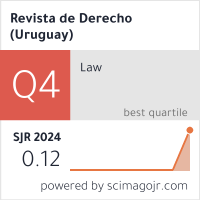Administrative law and technology
teleworking in the public service in Uruguay
DOI:
https://doi.org/10.47274/DERUM/38.7Keywords:
Telework, Civil service, Technology, Administrative Law, UruguayAbstract
The Research and Study Group in Administrative Law of the University of Montevideo already in 2009 addressed the study of the phenomenon of "telework" in the Public Administration, reflecting on Decree No. 420/007 of November 7, 2007 and its modern forms of civil service provision. The reality of the COVID-19 pandemic, which has highlighted this type of work, justifies taking up those ideas and analyzing them in their development and under the new reality, with the aim of contributing to the study and discussion of this form of provision of public function. Thus, in this work the phenomenon of teleworking in the Public Administration in comparative law is surveyed and updated, specifically in Spain, and in the Federal Government of the United States. Moving on to the analysis of the existing regulations in the Positive Law of Uruguay, and the examination of the legal and regulatory background in the area of telework and technology. Finally, to assess the virtues, defects and prospects of telework in Civil Service.
Downloads
References
Grupo de Investigación y Estudio de la Facultad de Derecho de la Universidad de Montevideo (2009). Reflexiones a propósito del Decreto 420/007 y las formas modernas de prestación de la función pública, Revista de Derecho de la Universidad de Montevideo, Año VIII, No. 16.
Rotondo, Felipe (2009). Manual de Derecho Administrativo, 7ª. edición, Ediciones del Foro, pág. 24 y ss.
Brito, Mariano (2004). Derecho Administrativo, Su Permanencia-Contemporaneidad-Prospectiva, Ed. Universidad de Montevideo, pág. 9 y ss.
Federico, Mario E. Gobernabilidad democrática y Estado de Derecho frente a las emergencias económicas y sociales, citado por Brito, Mariano (2004), Derecho Administrativo, Su Permanencia-Contemporaneidad-Prospectiva, Ed. Universidad de Montevideo, pág. 15.
Meilán Gil, José Luis, citado por Rotondo Felipe (2009), Manual de Derecho Administrativo, 7ª. edición, Ediciones del Foro, pág. 24 y ss.
Agencia Estatal Boletín Oficial del Estado (2020). En https://www.boe.es/diario_boe/txt.php?id=BOE-A-2020-11415.
USPTO (United States Patent and Trademark Office) (2018). Telework Annual Report. En: https://www.uspto.gov/sites/default/files/documents/Telework_Annual_Report_2018%20508%20Compliant.pdf
IMPO - Centro de información Oficial (2020). Sección Normativa y Avisos Legales del Uruguay. En https://www.impo.com.uy/cgi-bin/bases/consultaBasesBS.cgi?tipoServicio=3.
URCDP (2020). La protección de datos personales en tiempos de teletrabajo, en https://www.gub.uy/unidad-reguladora-control-datos-personales/comunicacion/noticias/proteccion-datos-personales-tiempos-teletrabajo.
URCDP (2020). Recomendaciones técnicas para realizar teletrabajo, en https://www.gub.uy/agencia-gobierno-electronico-sociedad-informacion-conocimiento/comunicacion/publicaciones/recomendaciones-tecnicas-para-realizar-teletrabajo.
Ivanega, Miriam (2011). Las relaciones de empleo público frente a la globalización del Derecho Administrativo, en Estudios Jurídicos en Homenaje al Profesor Juan Pablo Cajarville Peluffo, FCU, 1ª. Edición, pág.167 y ss.
Papa Juan Pablo II (1981). Encíclica Laborem Exercens, citado por Ivanega, Miriam (2011), Las relaciones de empleo público frente a la globalización del Derecho Administrativo, en Estudios Jurídicos en Homenaje al Profesor Juan Pablo Cajarville Peluffo, FCU, 1ª. Edición, pág. 168.






















 This work is under a
This work is under a 